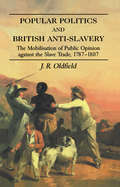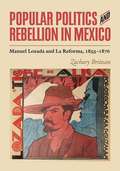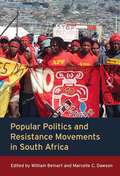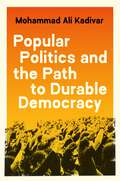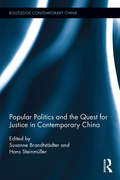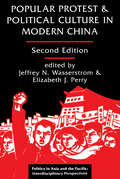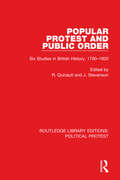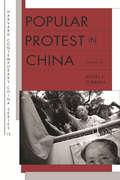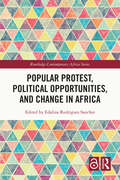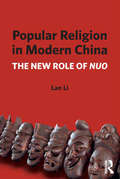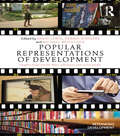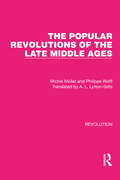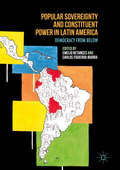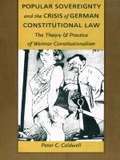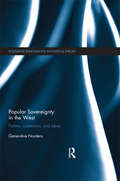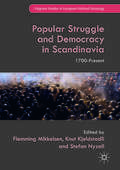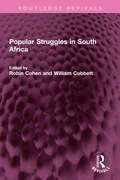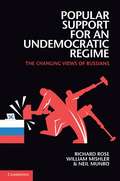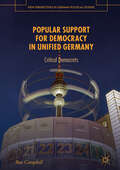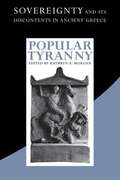- Table View
- List View
Popular Politics and British Anti-Slavery: The Mobilisation of Public Opinion against the Slave Trade 1787-1807
by J.R. OldfieldIn 1792, 400,000 people put their signature to petitions calling for the abolition of the slaves trade. This work explains how this remarkable expression of support for black people was organized and orchestrated, and how it contributed to the growth of popular politics in Britain.
Popular Politics and Rebellion in Mexico: Manuel Lozada and La Reforma, 1855-1876
by Zachary BrittsanThe political conflict during Mexico's Reform era in the mid-nineteenth century was a visceral battle between ideologies and people from every economic and social class. As Popular Politics and Rebellion in Mexico develops the story of this struggle, the role of one key rebel, Manuel Lozada, comes into focus. The willingness of rural peasants to take up arms to defend the Catholic Church and a conservative political agenda explains the bitterness of the War of Reform and the resulting financial and political toll that led to the French Intervention. Exploring the activities of rural Jalisco's residents in this turbulent era and Lozada's unique position in the drama, Brittsan reveals the deep roots of colonial religious and landholding practices, exemplified by Lozada, that stood against the dominant political current represented by Benito Juarez and liberalism. Popular Politics and Rebellion in Mexico also explores the conditions under which a significant segment of Mexican society aligned itself with conservative interests and French interlopers, revealing this constituency to be more than a collection of reactionary traitors to the nation. To the contrary, armed rebellion--or at least the specter of force--protected local commercial interests in the short run and enhanced the long-term prospects for political autonomy. Manuel Lozada's story adds a necessary layer of complexity to our understanding of the practical and ideological priorities that informed the tumultuous conflicts of the mid-nineteenth century.
Popular Politics and Rebellion in Mexico: Manuel Lozada and La Reforma, 1855-1876
by Zachary BrittsanThe political conflict during Mexico's Reform era in the mid-nineteenth century was a visceral battle between ideologies and people from every economic and social class. As Popular Politics and Rebellion in Mexico develops the story of this struggle, the role of one key rebel, Manuel Lozada, comes into focus. The willingness of rural peasants to take up arms to defend the Catholic Church and a conservative political agenda explains the bitterness of the War of Reform and the resulting financial and political toll that led to the French Intervention. Exploring the activities of rural Jalisco's residents in this turbulent era and Lozada's unique position in the drama, Brittsan reveals the deep roots of colonial religious and landholding practices, exemplified by Lozada, that stood against the dominant political current represented by Benito Juarez and liberalism. Popular Politics and Rebellion in Mexico also explores the conditions under which a significant segment of Mexican society aligned itself with conservative interests and French interlopers, revealing this constituency to be more than a collection of reactionary traitors to the nation. To the contrary, armed rebellion--or at least the specter of force--protected local commercial interests in the short run and enhanced the long-term prospects for political autonomy. Manuel Lozada's story adds a necessary layer of complexity to our understanding of the practical and ideological priorities that informed the tumultuous conflicts of the mid-nineteenth century.
Popular Politics and Resistance Movements in South Africa
by William Beinart Marcelle C. Dawson Julian Brown Tracy CarsonThis volume explores some of the key features of popular politics and resistance before and after 1994. It looks at continuities and changes in the forms of struggle and ideologies involved, as well as the significance of post-apartheid grassroots politics. Is this a new form of politics or does it stand as a direct descendent of the insurrectionary impulses of the late apartheid era? Posing questions about continuity and change before and after 1994 raises key issues concerning the nature of power and poverty in the country. Contributors suggest that expressions of popular politics are deeply set within South African political culture and still have the capacity to influence political outcomes. The introduction by William Beinart links the papers together, places them in context of recent literature on popular politics and ?history from below? and summarises their main findings, supporting the argument that popular politics outside of the party system remain significant in South Africa and help influence national politics. The roots of this collection lie in post-graduate student research conducted at the University of Oxford in the early twenty-first century.
Popular Politics and the Path to Durable Democracy (Princeton Studies In Global And Comparative Sociology Ser.)
by Mohammad Ali KadivarA groundbreaking account of how prolonged grassroots mobilization lays the foundations for durable democratizationWhen protests swept through the Middle East at the height of the Arab Spring, the world appeared to be on the verge of a wave of democratization. Yet with the failure of many of these uprisings, it has become clearer than ever that the path to democracy is strewn with obstacles. Mohammad Ali Kadivar examines the conditions leading to the success or failure of democratization, shedding vital new light on how prodemocracy mobilization affects the fate of new democracies.Drawing on a wealth of new evidence, Kadivar shows how the longest episodes of prodemocracy protest give rise to the most durable new democracies. He analyzes more than one hundred democratic transitions in eighty countries between 1950 and 2010, showing how more robust democracies emerge from lengthier periods of unarmed mobilization. Kadivar then analyzes five case studies—South Africa, Poland, Pakistan, Egypt, and Tunisia—to investigate the underlying mechanisms. He finds that organization building during the years of struggle develops the leadership needed for lasting democratization and strengthens civil society after dictatorship.Popular Politics and the Path to Durable Democracy challenges the prevailing wisdom in American foreign policy that democratization can be achieved through military or coercive interventions, revealing how lasting change arises from sustained, nonviolent grassroots mobilization.
Popular Politics and the Quest for Justice in Contemporary China (Routledge Contemporary China Series)
by Susanne Brandtstädter Hans SteinmüllerThe rise of popular politics is among one the most significant social and political developments the People’s Republic of China has witnessed in the post-Mao era. People from all walks of life have responded to rising inequalities and the privatization of collective goods with a new quest for justice. Although China has remained a censorial society under the authoritarian rule of the Chinese Communist Party, state-society relations are being remade by interventions of emergent publics through word and action. In this book, a group of anthropologists, specializing in Chinese society, examine various facets of popular politics, which are animated by the pursuit of justice, fairness and good government. The ethnographic chapters collectively analyse how ‘the political’ arises in particular judicial situations, provoking public judgements or other forms of critical engagement. Focusing on the interplay between private and public spaces, between morality and law and between speech and action, the contributors in this book explore how such engagements are changing Chinese society from the bottom-up. As the first systematic exploration of the relationship between popular politics, emergent publics and notions of justice in contemporary China, this book will be useful for students of Chinese Studies, Politics and Anthropology.
Popular Politics in the Making of the Modern Middle East
by John ChalcraftThe waves of protest ignited by the self-immolation of Muhammad Bouazizi in Tunisia in late 2010 highlighted for an international audience the importance of contentious politics in the Middle East and North Africa. John Chalcraft's ground-breaking account of popular protest emphasizes the revolutionary modern history of the entire region. Challenging top-down views of Middle Eastern politics, he looks at how commoners, subjects and citizens have long mobilised in defiance of authorities. Chalcraft takes examples from a wide variety of protest movements from Morocco to Iran. He forges a new narrative of change over time, creating a truly comparative framework rooted in the dynamics of hegemonic contestation. Beginning with movements under the Ottomans, which challenged corruption and oppression under the banners of religion, justice, rights and custom, this book goes on to discuss the impact of constitutional movements, armed struggles, nationalism and independence, revolution and Islamism. A work of unprecedented range and depth, this volume will be welcomed by undergraduates and graduates studying protest in the region and beyond.
Popular Protest And Political Culture In Modern China: Second Edition (Politics In Asia And The Pacific, Interdisciplinary Perspectives Ser.)
by Jeffrey N WasserstromThis innovative and widely praised volume uses the dramatic occupation of Tiananmen Square as the foundation for rethinking the cultural dimensions of Chinese politics. Now in a revised and expanded second edition, the book includes enhanced coverage of key issues, such as the political dimensions of popular culture (addressed in a new chapter on Chinese rock-and-roll by Andrew Jones) and the struggle for control of public discourse in the post-1989 era (discussed in a new chapter by Tony Saich). Two especially valuable additions to the second edition are art historian Tsao Tsing-yuan's eyewitness account of the making of the Goddess of Democracy, and an exposition of Chinese understandings of the term ?revolution? contributed by Liu Xiaobo, one of China's most controversial dissident intellectuals. The volume also includes an analysis (by noted social theorist and historical sociologist Craig C. Calhoun) of the similarities and differences between the ?new? social movements of recent decades and the ?old? social movements of earlier eras.TEXT CONCLUSION: To facilitate classroom use, the volume has been reorganized into groups of interrelated essays. The editors introduce each section and offer a list of suggested readings that complement the material in that section.
Popular Protest and Public Order: Six Studies in British History, 1790–1920 (Routledge Library Editions: Political Protest #17)
by R. Quinault and J. StevensonThis book, first published in 1974, examines the diverse nature of popular protest in Britain. Movements varied immensely from one another in their objectives, their social composition, their tactics and the geographical milieu.
Popular Protest in China (Harvard Contemporary China Series #15)
by Kevin J. O'BrienDo our ideas about social movements travel successfully beyond the democratic West? Unrest in China, from the dramatic events of 1989 to more recent stirrings, offers a rare opportunity to explore this question and to consider how popular contention unfolds in places where speech and assembly are tightly controlled. The contributors to this volume, all prominent scholars of Chinese politics and society, argue that ideas inspired by social movements elsewhere can help explain popular protest in China. Drawing on fieldwork in China, the authors consider topics as varied as student movements, protests by angry workers and taxi drivers, recruitment to Protestant house churches, cyberprotests, and anti-dam campaigns. Their work relies on familiar concepts—such as political opportunity, framing, and mobilizing structures—while interrogating the usefulness of these concepts in a country with a vastly different history of class and state formation than the capitalist West. The volume also speaks to “silences” in the study of contentious politics (for example, protest leadership, the role of grievances, and unconventional forms of organization), and shows that well-known concepts must at times be modified to square with the reality of an authoritarian, non-western state.
Popular Protest in East Germany: Judgements On The Street (Routledge Advances in European Politics)
by Gareth DaleAn incisive new study of dissent and protest in the German Democratic Republic, focusing on the upheaval of 1989-1990. The author, an active participant both in the 'Citizens' Movement' and in the street protests of that year, draws upon a vast array of sources including interviews, documents from the archives of the old regime and the Citizens' Movement and his own diary entries, to explore the causes and processes of the East German revolution. The book is at once a lucid and vibrant narrative history and a pioneering contribution to research in this field.
Popular Protest in Late Medieval English Towns
by Samuel K. Cohn Jr.Contrary to received opinion, revolts and popular protests in medieval English towns were as frequent and as sophisticated, if not more so, as those in the countryside. This groundbreaking study refocuses attention on the varied nature of popular movements in towns from Carlisle to Dover and from the London tax revolt of Longbeard in 1196 to Jack Cade's Rebellion in 1450, exploring the leadership, social composition, organisation and motives of popular rebels. The book charts patterns of urban revolt in times of strong and weak kingship, contrasting them with the broad sweep of ecological and economic change that inspired revolts on the continent. Samuel Cohn demonstrates that the timing and character of popular revolt in England differed radically from revolts in Italy, France and Flanders. In addition, he analyses repression and waves of hate against Jews, foreigners and heretics, opening new vistas in the comparative history of late medieval Europe.
Popular Protest, Political Opportunities, and Change in Africa (Routledge Contemporary Africa)
by Edalina Rodrigues SanchesThis book offers a fresh analysis of third wave popular protests in Africa, shedding light on the complex dynamics between political change and continuity in contemporary Africa. The book argues that protests are simultaneously products and generators of change in that they are triggered by micro-and-macrosocial changes, but they also have the capacity to transform the nature of politics. By examining the triggers, actors, political opportunities, resources and framing strategies, the contributors shed light onto tangible (e.g. policy implementation, liberal reforms, political alternation) and intangible (e.g. perceptions, imagination, awareness) forms of change elicited by protests. It reveals the relevant role of African protests as engines of democracy, accountability and collective knowledge. Bringing popular protests in authoritarian and democratic settings into discussion, this book will be of interest to scholars of African politics, democracy and protest movements.
Popular Religion in Modern China: The New Role of Nuo
by Lan LiSince the early 1980s, China's rapid economic growth and social transformation have greatly altered the role of popular religion in the country. This book makes a new contribution to the research on the phenomenon by examining the role which popular religion has played in modern Chinese politics. Popular Religion in Modern China uses Nuo as an example of how a popular religion has been directly incorporated into the Chinese Community Party's (CCP) policies and how the religion functions as a tool to maintain socio-political stability, safeguard national unification and raise the country's cultural 'soft power' in the eyes of the world. It provides rich new material on the interplay between contemporary Chinese politics, popular religion and economic development in a rapidly changing society.
Popular Representations of Development: Insights from Novels, Films, Television and Social Media (Rethinking Development)
by David Lewis Michael Woolcock Dennis RodgersAlthough the academic study of development is well established, as is also its policy implementation, less considered are the broader, more popular understandings of development that often shape agendas and priorities, particularly in representative democracies. Through its accessible and provocative chapters, Popular Representations of Development introduces the idea that while the issue of ‘development’ – defined broadly as problems of poverty and social deprivation, and the various agencies and processes seeking to address these – is normally one that is discussed by social scientists and policy makers, it also has a wider ‘popular’ dimension. Development is something that can be understood through studying literature, films, and other non-conventional forms of representation. It is also a public issue, one that has historically been associated with musical movements such as Live Aid and increasingly features in newer media such as blogs and social networking. The book connects the effort to build a more holistic understanding of development issues with an exploration of the diverse public sphere in which popular engagement with development takes place. This book gives students of development studies, media studies and geography as well as students in the humanities engaging with global development issues a variety of perspectives from different disciplines to open up this new field for discussion.
The Popular Revolutions of the Late Middle Ages (Routledge Library Editions: Revolution #22)
by Michel Mollat Philippe WolffThis book, first published in 1973, examines the period when wars, famines and epidemics bred widespread conflicts, culminating in the revolutionary years of 1378–82 with the Florentine ‘Ciompi’, revolts in Flanders and France and the risings among English labourers. The analysis ends with the Hussite crisis which gave the movement a new aspect. The troubles were varied, with hunger riots in cities and brigandage in the country, open struggles between lords and peasants, urban conflicts over municipal power, and labour conflicts over pay and hours.
Popular Sovereignty and Constituent Power in Latin America
by Emelio Betances Carlos Figueroa IbarraThis book combines a bottom-up and top-down approach to the study of social movements in relationship to the development of constituent and constituted power in Latin America. The contributors to this volume argue that the radical transformation of liberal representative democracy into participative democracy is what colours these processes as revolutionary. The core themes include popular sovereignty, constituted power, constituent power, participatory democracy, free trade agreements, social citizenship, as well as redistribution and recognition issues. Unlike other collections, which provide broad coverage of social movements at the expense of depth, this book is of thematic focus and illuminates the relationships between rulers and ruled as they transform liberal democracy.
Popular Sovereignty and the Crisis of German Constitutional Law: The Theory and Practice of Weimar Constitutionalism
by Peter C. CaldwellPopular Sovereignty and the Crisis of German Constitutional Law is a historical analysis of competing doctrines of constitutional law during the Weimar Republic. It chronicles the creation of a new constitutional jurisprudence both adequate to the needs of a modern welfare state and based on the principle of popular sovereignty. Peter C. Caldwell explores the legal nature of democracy as debated by Weimar's political theorists and constitutional lawyers. Laying the groundwork for questions about constitutional law in today's Federal Republic, this book draws clear and insightful distinctions between strands of positivist and anti-positivist legal thought, and examines their implications for legal and political theory.Caldwell makes accessible the rich literature in German constitutional thought of the Weimar period, most of which has been unavailable in English until now. On the liberal left, Hugo Preuss and Hans Kelsen defended a concept of democracy that made the constitution sovereign and, in a way, created the "Volk" through constitutional procedure. On the right, Carl Schmitt argued for a substantial notion of the "Volk" that could overrule constitutional procedure in a state of emergency. Rudolf Smend and Heinrich Triepel located in the constitution a set of inviolable values of the political community, while Hermann Heller saw in it a guarantee of substantial social equality. Drawing on the work of these major players from the 1920s, Caldwell reveals the various facets of the impassioned constitutional struggles that permeated German legal and political culture during the Weimar Republic.
Popular sovereignty in historical perspective
by Bourke, Richard and Skinner, Quentin Richard Bourke Quentin SkinnerThis collaborative volume offers the first historical reconstruction of the concept of popular sovereignty from antiquity to the twentieth century. First formulated between the late sixteenth and mid-seventeenth centuries, the various early modern conceptions of the doctrine were heavily indebted to Roman reflection on forms of government and Athenian ideas of popular power. This study, edited by Richard Bourke and Quentin Skinner, traces successive transformations of the doctrine, rather than narrating a linear development. It examines critical moments in the career of popular sovereignty, spanning antiquity, medieval Europe, the early modern wars of religion, the revolutions of the eighteenth century and their aftermath, decolonisation and mass democracy. Featuring original work by an international team of scholars, the book offers a reconsideration of one of the formative principles of contemporary politics by exploring its descent from classical city-states to the advent of the modern state.
Popular Sovereignty in the West: Polities, Contention, and Ideas (Routledge Innovations in Political Theory)
by Geneviève NootensThis book is an inquiry into the history of the idea of popular sovereignty as it has been shaped by the struggles between rulers and ruled. It builds on the notion that a thorough analysis of how the idea of popular sovereignty emerges from, and interacts with, a political history of contention within changing polities can help us to draw similarities and differences with our own age. Providing a historical perspective to the present day, Nootens pays strong attention to the role of democratization processes and to the relationship between meanings conveyed by the idea of popular sovereignty, political contention, and changing representations of the governing relationship. The latter has been undergoing significant transformations in the last decades, and these transformations impact significantly upon people’s rights, interests, wealth, and capacity to decide for themselves. In order to understand popular sovereignty in an era of globalization, this book argues that focus should be put on current struggles between rulers and ruled, as well as on current transformations of the relationship between public and private spheres. Understanding the claims involved in current processes of contention over decision-making processes is key to understanding popular sovereignty in an era of globalization. Making an important contribution to debates on sovereignty, Popular Sovereignty in the West will be of interest to students and scholars of modern political theory, sovereignty, and democratization studies.
Popular Struggle and Democracy in Scandinavia
by Flemming Mikkelsen Knut Kjeldstadli Stefan NyzellThis book focuses on popular struggles in Denmark, Norway and Sweden from 1700-2015, and how popular struggle in the form of hunger riots, tax rebellions, petition drives, strikes, demonstrations, public meetings and social movements paved the way for the introduction and development of civil liberties and political rights. The author portrays social and political mass mobilization of ordinary people as vital to the construction of democracy, and an essential condition for the formation of the Scandinavian welfare states. Popular Struggle and Democracy in Scandinavia shows the transnational connections between Denmark, Norway and Sweden and between Scandinavia and the rest of Europe, and also contains a comparison of popular struggle in Scandinavia seen in a wider European perspective. The book will be of interest to social scientists, historians and students and researchers with an interest in popular struggles in Scandinavia.
Popular Struggles in South Africa (Routledge Revivals)
by William Cobbett Robin Cohen‘Popular Struggles or One Struggle?’ Originally published in 1988 shortly after the miners’ strike in South Africa of 1987, this book begins with a strongly argued and seminal discussion of this question by William Cobbett and Robin Cohen. The book had an urgency and relevance at its time of original publication, but many of the themes it discusses remain as relevant today. Nearly all the contributors were close to the sites of encounter and resistance they described, but at the same time they and the editors place the individual cases within the historical context.
Popular Support for an Undemocratic Regime
by Neil Munro Richard Rose William MishlerTo survive, all forms of government require popular support, whether voluntary or involuntary. Following the collapse of the Soviet system, Russia's rulers took steps toward democracy, yet under Vladimir Putin Russia has become increasingly undemocratic. This book uses a unique source of evidence, eighteen surveys of Russian public opinion from the first month of the new regime in 1992 up to 2009, to track the changing views of Russians. Clearly presented and sophisticated figures and tables show how political support has increased because of a sense of resignation that is even stronger than the unstable benefits of exporting oil and gas. Whilst comparative analyses of surveys on other continents show that Russia's elite is not alone in being able to mobilize popular support for an undemocratic regime, Russia provides an outstanding caution that popular support can grow when governors reject democracy and create an undemocratic regime.
Popular Support for Democracy in Unified Germany: Critical Democrats (New Perspectives in German Political Studies)
by Ross CampbellThis book examines attitudes towards democracy in the Federal Republic of Germany. By drawing on extensive survey evidence, it charts Germans’ changing views of the political system prior to and following unification. The study examines four aspects of the political system: how it functions overall, attitudes towards the Basic Law, trust in representative institutions, and views of the European Union. Rather than accepting or rejecting democracy, the research shows how Germans merge shades of criticism and support. In addition, it pinpoints the factors that condition support, showing how it is influenced by durable and changeable stimuli. Overall, the findings challenge suggestions of a crisis of democracy but they also demonstrate that support is particularly low towards aspects of the European Union. This book appeals to readers interested in public opinion and democracy in Germany, along with those interested in the changing relationship between citizens and the state.
Popular Tyranny: Sovereignty and Its Discontents in Ancient Greece
by Morgan Kathryn A.The nature of authority and rulership was a central concern in ancient Greece, where the figure of the king or tyrant and the sovereignty associated with him remained a powerful focus of political and philosophical debate even as Classical Athens developed the world's first democracy. This collection of essays examines the extraordinary role that the concept of tyranny played in the cultural and political imagination of Archaic and Classical Greece through the interdisciplinary perspectives provided by internationally known archaeologists, literary critics, and historians.<P><P>The book ranges historically from the Bronze and early Iron Age to the political theorists and commentators of the middle of the fourth century B.C. and generically across tragedy, comedy, historiography, and philosophy. While offering individual and sometimes differing perspectives, the essays tackle several common themes: the construction of authority and of constitutional models, the importance of religion and ritual, the crucial role of wealth, and the autonomy of the individual. Moreover, the essays with an Athenian focus shed new light on the vexed question of whether it was possible for Athenians to think of themselves as tyrannical in any way. As a whole, the collection presents a nuanced survey of how competing ideologies and desires, operating through the complex associations of the image of tyranny, struggled for predominance in ancient cities and their citizens.
